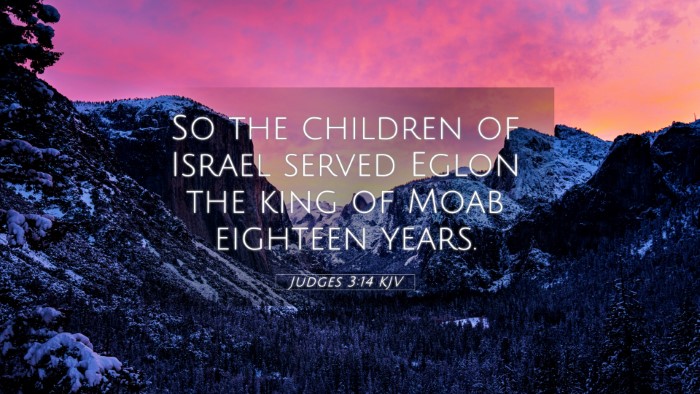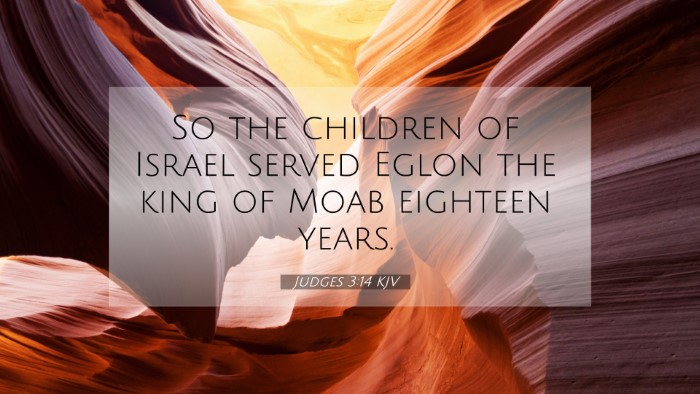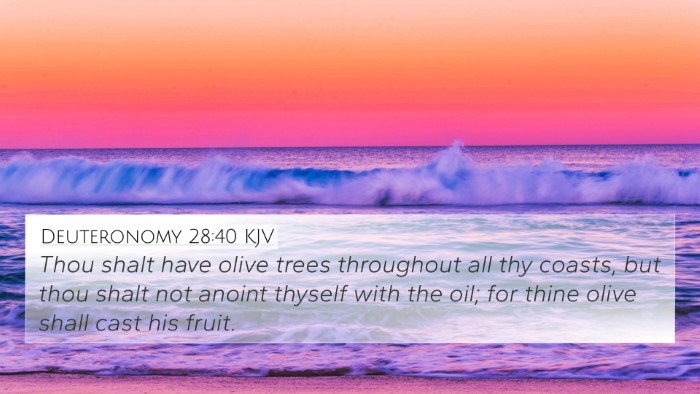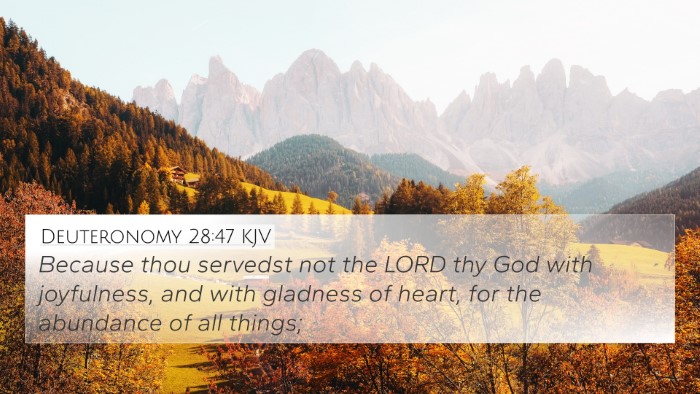Understanding Judges 3:14
Judges 3:14 states: "And the children of Israel served Eglon the king of Moab eighteen years." This verse captures a significant moment in the history of Israel, where they experienced oppression and subjugation which ultimately shines a light on the themes of disobedience, judgement, and redemption found throughout the biblical narrative.
Contextual Overview
The Book of Judges chronicles the tumultuous period following the conquest of Canaan, where Israel oscillated between faithfulness to God and turning away from His commandments. This pattern reflected a deeper thematic progression that can be traced throughout scripture.
Commentary Insights
-
Matthew Henry's Commentary:
Matthew Henry describes the oppression of Israel under Eglon as a direct consequence of their disobedience to God. The Israelites succumbed to temptation, leading them to serve a foreign king. This reflects the historical cycle of sin, servitude, supplication, and salvation, emphasizing that turning from God leads to suffering.
-
Albert Barnes' Notes:
Barnes outlines the historical significance of the Moabite oppression, highlighting Israel's loss of freedom. This serves as a grim reminder of how Israel's spiritual lapses led to tangible socio-political repercussions, making it a critical moment for introspection about loyalty and divine favor.
-
Adam Clarke's Commentary:
Clarke elaborates on the duration of the oppression—eighteen years—which signifies a long period of hardship and the importance of the number as a symbol of testing. He comments on the need for national repentance and how prolonged suffering may lead God's people to cry out for deliverance.
Thematic Connections
This verse can be linked to various themes throughout the Bible:
- Spiritual Disobedience and Its Consequences: Deuteronomy 28:15-68 discusses blessings and curses associated with Israel's faithfulness to God.
- The Pattern of Sin and Redemption: 2 Peter 2:22 alludes to the cycle of sin that Israel repeatedly engages in throughout Judges.
- Calling for Deliverance: Psalm 50:15 emphasizes calling upon God in times of trouble, paralleling Israel's cry during their oppression.
- The Role of Foreign Oppressors: Isaiah 10:5-7 details how God uses foreign nations to bring about corrective discipline among His people.
- God’s Faithfulness: Romans 11:29 assures that God does not revoke His promises, providing a backdrop to Israel's ultimate restoration post-Eglon.
- The Nature of Leadership: 1 Samuel 8:7 serves as a prelude to Israel's desire for kingship which precedes their servitude under foreign rulers.
- Restoration and Forgiveness: Jeremiah 29:11 reflects God's plans for His people even amidst their trials, hinting at future deliverance from oppression.
- The Importance of Repentance: Acts 3:19 speaks to the need for repentance and returning to God, echoing the lessons from Israel’s experience.
- Endurance through Trials: James 1:2-4 discusses how trials produce perseverance, mirroring Israel's need for resilience during oppression.
- Hope of Salvation: Micah 7:18-19 presents God's characters of love and forgiveness, pointing toward the eventual hope of deliverance for Israel.
Cross-Referencing Biblical Texts
The richness of scripture allows for profound connections between biblical verses. Understanding Judges 3:14 in conjunction with the verses mentioned above can enhance one's grasp of the overarching narrative of the Bible, revealing God's character and His relationship with His people.
Using Tools for Bible Cross-Referencing
To fully appreciate the connections between verses, utilizing tools like a bible concordance, bible cross-reference guide, or comprehensive cross-reference materials is beneficial. Such resources can assist in identifying links between Old and New Testament scriptures, serving as a foundation for deeper studies into the thematic elements of the Bible.
Conclusion
Judges 3:14 serves as a reminder of the implications of Israel's choices and reflects a broader truth about divine justice and mercy. As believers, understanding these themes and their connections helps illuminate the larger narrative of redemption and faithfulness found throughout scripture.





